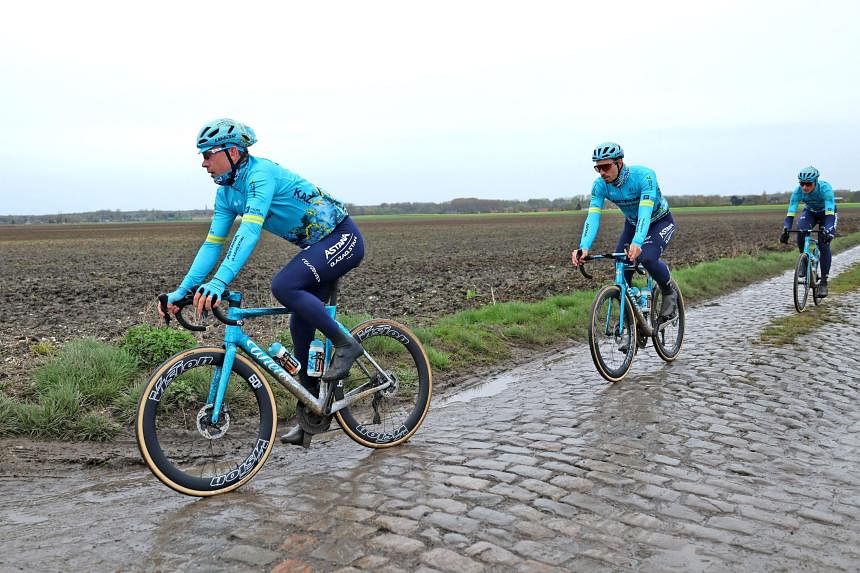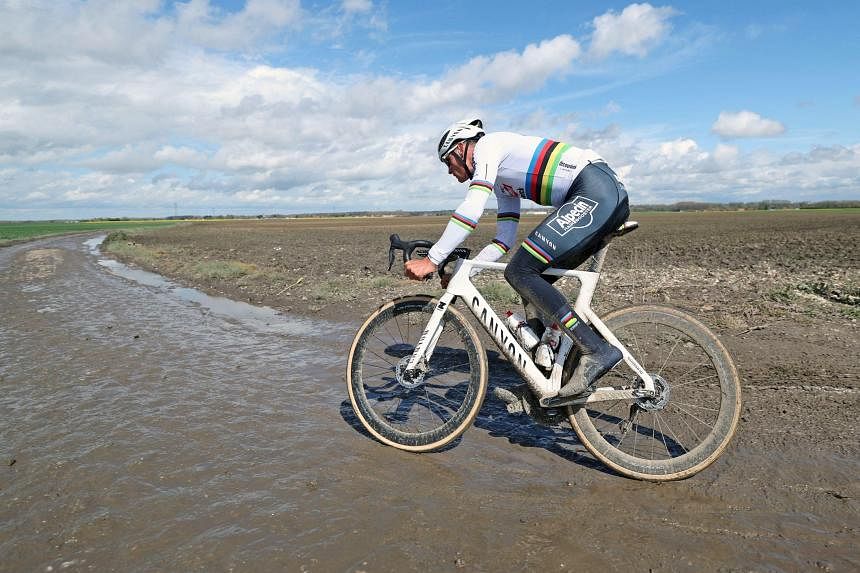COMPIEGNE, France – Defending champion Mathieu van der Poel goes into his title defence at the muddy, cobbled Paris-Roubaix bike race on April 7 sceptical over new safety measures in a week when several of the sport’s biggest stars were hospitalised.
Miles of mud and millions of cobbles have lent the race the name “Hell of the North” and a reputation of the most gruelling one-day race in cycling.
In 2018, Belgian rider Michael Goolaerts was found slumped dead by the roadside after heart failure, and the peloton will pass a memorial to him along the route.
First run in 1896, broken wheels and broken bones have been part of the annual race due to the hefty hunks of cobble that surface around 56km of the 260km route.
As part of safety measures, organisers this week introduced a U-turn to slow the riders ahead of their entry into the legendary section outside the 650m-deep Arenberg coal mine.
Van der Poel, who is the road race world champion and one-day racing’s hottest star, asked on social media platform X: “Is this a joke?”
The Dutchman, 29, added: “I think it’s good that they’re trying something. But, in my opinion, the chicane is not the right solution and also to do it in the week before the race is not the best option either.”
While he believes that change is “not always the best thing to do”, one thing he will not change are his tactics as he pursues his sixth Monument title. He added: “If you want to win, you have to be where everyone wants to be at the crucial moments.”
As cycling fans tune in on April 7, their thoughts will be with Tour de France champion Jonas Vingegaard, Remco Evenepoel and Primoz Roglic, who were among those hospitalised after crashing at the Tour of the Basque Country on April 4.
This has cast a question mark over their participation in this season’s Tour de France, which starts on June 29.
Vingegaard was initially diagnosed with a broken collarbone and several broken ribs. His team said on April 5 that he has also suffered lung damage, but is stable.
Road cycling’s five huge one-day races are known as the Monuments due to their epic length. Among them, Paris-Roubaix, which starts in Compiegne, 80km from Paris, is known as “queen of the classics” because it is the toughest.
The 25 teams select seven of their sturdiest riders on the cobbles to cope with the repeated punctures and frequent falls.
In 2021, winner Sonny Colbrelli fell to the ground at the finish line, unrecognisable in a coat of mud. The following year, after a race in drier conditions, champion Dylan van Baarle rode into the Roubaix velodrome cloaked in ghostly grey dust.
Race folklore has it that the cobbles decide the winner, who receives one of the rough-hewn slabs in the guise of a champion’s trophy along with a €30,000 (S$44,000) cheque and a carton containing french fries and cold beer.
There are 29 cobbled sections along the 260km route, each of them given a rating of one to five stars depending on their bone-rattling potential. Six are four-star and three of them five-star.
These sections can be as narrow as three metres, are by no means flat, and are flanked with a daunting drainage ditch on one side.
At last week’s other great cobbled classic, the Tour of Flanders, which van der Poel won with ease, there were no significant accidents.
Yet, in the build-up to the race, one of cycling’s top stars, Wout van Aert, was left moaning in agony after a high-speed fall sparked a safety debate.
Belgian newspaper Het Nieuwsblad had identified the section where the fall eventually occurred as a risk.
That is not the only concern about the road. Roubaix regional officials plead each year with fans and curious onlookers to refrain from taking home souvenir cobbles, considered part of the heritage of one of France’s less affluent regions.
Separately, Spanish cycling great Miguel Indurain, a five-time Tour de France winner, got back his €6,500 bicycle from the police after it was stolen from a seaside town in north-eastern Spain, police said on April 5.
The 59-year-old is preparing for the Titan Desert, a six-day mountain bike race through the Moroccan desert from April 28. Local media reported that his bicycle was stolen from a van parked outside the hotel where Indurain and his team were staying. AFP


